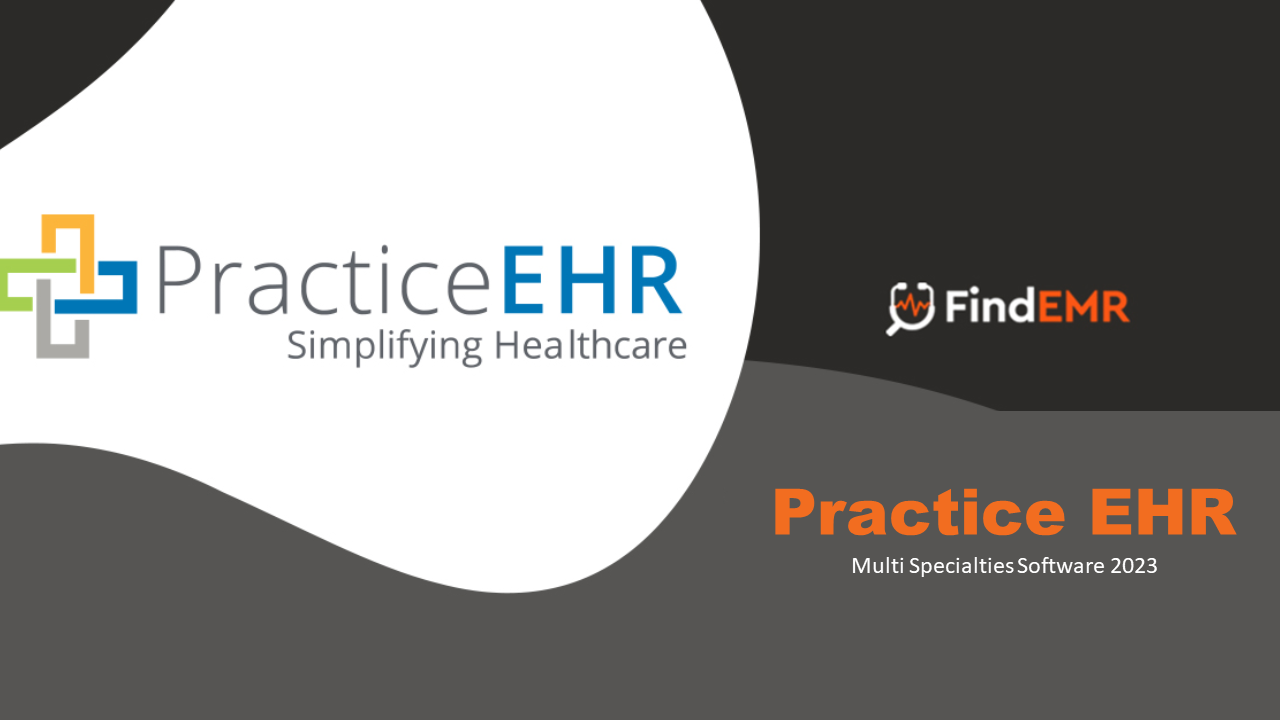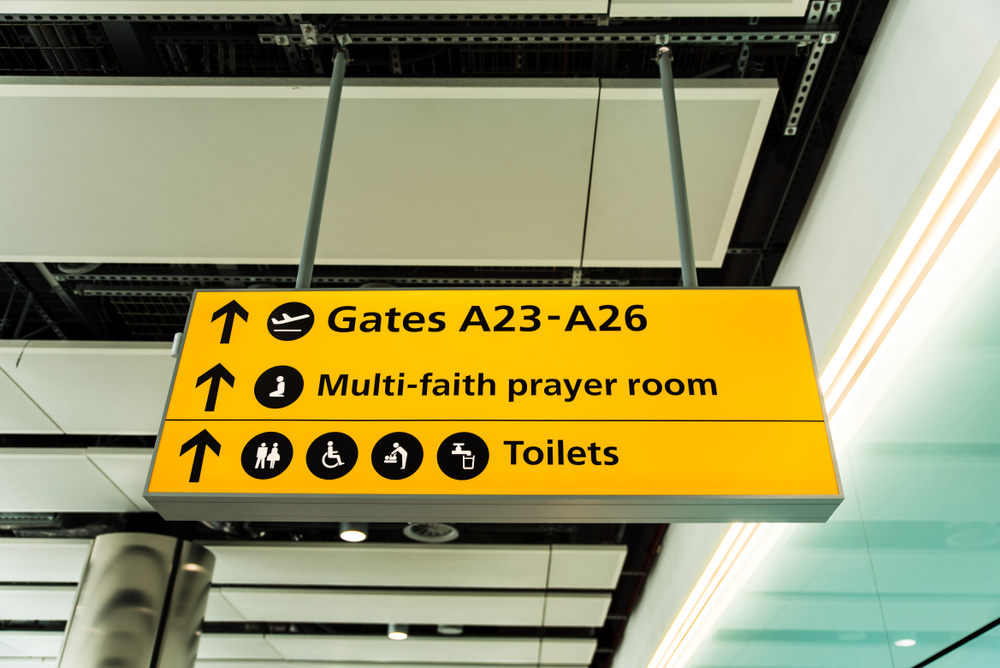Health
Multi Specialties Practice EHR Software 2023

Practice EHR is a practice management solution that can help your practice run more smoothly and efficiently. You can benefit from specialty-specific EHR, PM solutions and revenue cycle management services, and practice management workflows that are tailored to your practice. With these solutions, billing and practice management are simplified. You can save time and money by focusing on more important tasks.
Features
Practice EHR is a cloud-based software that allows you to access your patient’s health records and documents from a mobile device or remote desktop. You can customize your EHR to suit your practice’s specific needs and preferences. It is fully interoperable with other systems, labs and other medical equipment. It also offers e-prescribing, making it convenient for your patients.
Practice EHR can help you reduce overhead and improve efficiency in your practice. With its robust features, this software can help you streamline every aspect of your practice. This benefits your customers, staff, and bottom line. This easy-to-use software allows doctors to spend more time with patients and less time completing administrative tasks.
Benefits
There are many benefits of a Practice EHR, but one of the biggest is that it can help you manage patient data in one central location. The EHR can also help you streamline your billing and scheduling processes. Moreover, it can automate many routine tasks that were once carried out manually. It can also help your staff focus on other tasks like marketing.
Using an EHR reduces paper work. It helps you manage all information in one software, thus eliminating the need for multiple logins. EHR software may even have a mobile application that enables you to manage your practice from any location, including your mobile phone. This allows you to do everything from scheduling and billing to taking notes on the go.
Costs
Costs for practice EHR systems vary widely, depending on which type you choose and how you deploy it. For example, a multi-physician practice can expect to spend $150k to $162k to implement an EHR, while its first-year maintenance costs may be $85,000. While there are some incentives available, such as the Medicare EHR Incentive Program, to help offset these costs, the initial investment is significant. Practices should also consider additional costs, such as data backup and storage.
Training is another major expense when implementing an EHR system. Many systems require a significant amount of training, and a failure to plan for this can result in staff members struggling to stay current. Training is usually offered in different levels and can range from low-cost options for tech-savvy staff members to extensive, hands-on training for employees who need it most.
Interoperability
The interoperability of practice EHR is a key component of health information exchange (HIE). Interoperability helps physicians maintain continuity of care and improve patient outcomes. Interoperability enables physicians to share patient records with other facilities without compromising patient privacy and security. This also ensures that a patient can receive the best possible care across different health care settings.
The benefits of EHR interoperability are numerous. For example, delays in receiving patient results and records has left clinicians unable to complete accurate diagnoses or treatment plans. An interoperable EHR system will allow clinicians to treat patients faster and reduce the risk of medical malpractice lawsuits.
Read more about: DrChrono EHR – Best Medical Billing EMR Software 2023
Billing module
One of the most important features of an EHR billing module is its ability to automatically generate reports on the status of billing submissions and payments. This allows you to see if you’ve submitted or received a billing request, which will help you estimate when to expect reimbursement. By automating billing and collecting payments, an EHR billing module can also improve your practice’s financial management.
The billing process in family practices can be complex and time-consuming. Practice EHR’s integrated medical billing solution, IMS, helps physicians and billing staff to save time and streamline the entire process. It also gives them the ability to print statements and export them to other systems. It also integrates with the practice’s appointment scheduling system, meaning redundant patient information doesn’t have to be entered twice.
Related Resources:
Health
Nourish Your Life Today And Expand Your Life Span in 2024

In a world that often demands more than it gives, finding ways to nourish your life can lead to a more fulfilling and balanced existence. Nourishment goes beyond the food we eat; it encompasses our mental, emotional, and physical well-being. To truly nourish your life, it’s essential to cultivate habits and practices that promote overall health and happiness. This comprehensive guide will explore various strategies to help you nourish your life in every aspect.
1. Understanding True Nourishment
What Does It Mean to Nourish Your Life?
Nourishing your life means providing the necessary sustenance for your body, mind, and soul to thrive. It involves adopting a holistic approach that includes healthy eating, mental well-being, emotional balance, and physical fitness.
The Importance of Holistic Well-being
Holistic well-being recognizes the interconnectedness of the different aspects of our lives. By addressing all areas—physical, mental, emotional, and spiritual—we can achieve a state of harmony and balance.
2. Nourishing Your Body
Balanced Nutrition
Eating a balanced diet rich in fruits, vegetables, whole grains, lean proteins, and healthy fats is fundamental to nourishing your body. These foods provide essential nutrients that support overall health and vitality.
Hydration
Staying hydrated is crucial for bodily functions, including digestion, circulation, and temperature regulation. Aim to drink at least 8 glasses of water daily and adjust based on your activity level and environment.
Regular Exercise
Incorporating regular physical activity into your routine helps maintain a healthy weight, boosts energy levels, and improves mood. Choose activities you enjoy, such as walking, cycling, swimming, or yoga.
Adequate Sleep
Quality sleep is essential for physical health and cognitive function. Establish a consistent sleep routine and aim for 7-9 hours of sleep per night to ensure your body can rest and repair.
3. Nourishing Your Mind
Continuous Learning
Keeping your mind active through continuous learning helps maintain cognitive function and mental agility. Engage in activities like reading, puzzles, learning a new skill, or taking up a hobby.
Mindfulness and Meditation
Practicing mindfulness and meditation can reduce stress, enhance focus, and promote emotional stability. Start with a few minutes each day and gradually increase the duration as you become more comfortable.
Mental Health Support
Seeking support for mental health issues is crucial. Therapy, counseling, and support groups can provide valuable resources for managing stress, anxiety, depression, and other mental health conditions.
4. Nourishing Your Emotional Health
Building Resilience
Resilience is the ability to bounce back from adversity. Cultivate resilience by developing a positive outlook, practicing self-compassion, and maintaining a strong support network.
Emotional Expression
Expressing emotions in a healthy way is vital for emotional health. Journaling, talking to a friend, or engaging in creative activities like art or music can help process and express feelings.
Healthy Relationships
Building and maintaining healthy relationships contribute significantly to emotional well-being. Invest time in nurturing connections with family, friends, and loved ones.
5. Nourishing Your Spirit
Finding Purpose and Meaning
Having a sense of purpose and meaning in life is essential for spiritual nourishment. This can come from work, hobbies, volunteering, or other activities that provide a sense of fulfillment.
Spiritual Practices
Engaging in spiritual practices, whether through religion, meditation, or personal reflection, can enhance your sense of connection and inner peace.
Nature Connection
Spending time in nature can be incredibly grounding and rejuvenating. Activities like hiking, gardening, or simply sitting in a park can foster a deeper connection with the natural world.
6. Practical Steps to Nourish Your Life
Setting Goals
Set realistic and achievable goals that align with your values and passions. Having clear goals gives direction and purpose, motivating you to make positive changes.
Creating a Routine
Establishing a daily routine that includes time for self-care, work, and leisure helps create balance. Consistency in your routine can lead to better habits and improved well-being.
Self-Care Practices
Self-care involves taking deliberate actions to care for your physical, mental, and emotional health. This could include activities like taking a relaxing bath, reading a book, or practicing yoga.
7. Overcoming Barriers to Nourishment
Time Management
One of the biggest challenges to nourishing your life is finding the time. Prioritize your well-being by scheduling time for activities that nourish you, and learn to say no to commitments that drain your energy.
Staying Motivated
Maintaining motivation can be difficult. Surround yourself with supportive people, track your progress, and celebrate small victories to stay motivated on your journey.
Access to Resources
Access to resources like healthy food, fitness facilities, and mental health support can be a barrier. Explore community resources, online programs, and affordable options to overcome these challenges.
8. The Benefits of a Nourished Life
Improved Physical Health
Adopting nourishing habits can lead to better physical health, including increased energy levels, improved immune function, and reduced risk of chronic diseases.
Enhanced Mental Clarity
Nourishing your mind through continuous learning and mental health support can enhance cognitive function, memory, and mental clarity.
Greater Emotional Stability
Practicing emotional expression and building resilience can lead to greater emotional stability, reducing stress and improving overall mood.
Deeper Spiritual Connection
Engaging in spiritual practices and finding purpose can lead to a deeper sense of connection and inner peace, enriching your life experience.
Conclusion
Nourishing your life is an ongoing journey that requires intentional effort and commitment. By addressing all aspects of well-being—physical, mental, emotional, and spiritual—you can achieve a balanced and fulfilling life. Remember, small, consistent changes can lead to significant improvements in your overall well-being.
FAQs
1. How can I start incorporating mindfulness into my daily routine?
Begin with short sessions of mindfulness meditation, focusing on your breath and being present in the moment. Gradually increase the duration and try to incorporate mindfulness into everyday activities like eating and walking.
2. What are some affordable ways to improve personal well-being?
Affordable ways to improve well-being include practicing yoga at home, using free health apps, engaging in outdoor activities, and connecting with supportive communities online or locally.
3. How does wearable technology benefit personal well-being?
Wearable technology helps track physical activity, monitor sleep patterns, and provide health insights, enabling individuals to make informed decisions about their well-being and maintain healthy habits.
4. What are some effective stress management techniques?
Effective stress management techniques include mindfulness meditation, deep breathing exercises, physical activity, journaling, and spending time in nature.
5. How can I maintain a work-life balance?
Maintain a work-life balance by setting boundaries, prioritizing tasks, taking regular breaks, and ensuring time for personal activities and relaxation. Flexible working conditions and ergonomic workspaces also help in achieving this balance.
Health
How Europeans can use surrogacy in Ukraine to find their happiness

Surrogacy has emerged as a viable option for individuals and couples across the globe facing challenges with conception or pregnancy. Among the countries offering surrogacy services, Ukraine has gained prominence as a popular destination, attracting prospective parents from Europe and beyond. In this comprehensive guide, we delve into the landscape of surrogacy in Ukraine, providing insights, considerations, and essential information for European individuals and couples exploring this pathway to parenthood.
The Legal Landscape of Surrogacy
One of the primary draws of surrogacy in Ukraine for European intended parents is its favorable legal framework. Ukrainian legislation permits surrogacy arrangements, providing a clear legal pathway for establishing parental rights. The country’s laws prioritize the rights of intended parents, ensuring that they are recognized as the legal parents of the child born through surrogacy, with the surrogate and her husband (if applicable) relinquishing all parental rights.

Medical Expertise and Infrastructure
Ukraine boasts a robust medical infrastructure and a wealth of fertility clinics with advanced technologies and experienced professionals specializing in assisted reproductive techniques. Prospective parents can access comprehensive medical evaluations, fertility treatments, and surrogacy services tailored to their specific needs.
Surrogacy in Ukraine: Affordability and Accessibility
Compared to surrogacy options in other European countries or the United States, surrogacy in Ukraine is often more affordable, making it an attractive option for European individuals and couples seeking cost-effective alternatives. The relatively lower cost does not compromise the quality of medical care or legal protections, offering a compelling value proposition for prospective parents.
Ethical Considerations
While Ukraine provides a conducive legal and medical environment for surrogacy, prospective parents should approach the process with ethical considerations in mind. It is essential to prioritize the well-being and rights of all parties involved, including the surrogate, egg donor (if applicable), and the child. Open communication, transparency, and respect for the autonomy and dignity of the surrogate are paramount throughout the surrogacy journey.
Cultural and Logistical Factors of Surrogacy
European intended parents embarking on the surrogacy journey in Ukraine may encounter cultural and logistical differences. Understanding and navigating these nuances, including language barriers, cultural norms, and logistical arrangements, are integral to ensuring a smooth and successful surrogacy experience.
Surrogacy in Ukraine offers European individuals and couples a promising pathway to parenthood, combining legal clarity, medical expertise, affordability, and accessibility. By familiarizing themselves with the legal framework, medical infrastructure, ethical considerations, and cultural aspects of surrogacy in Ukraine, prospective parents can make informed decisions and embark on their journey to building a family with confidence and peace of mind.
Health
Best DNA Testing Kits: Discover The Secrets Stored In Your Genes

We all want to learn more about our identities. Who lived in the past before us? From whence did they originate? Do we have relatives that we are unaware of? DNA testing businesses will reportedly address these questions. Many at-home genealogy DNA tests available today may help you determine your ethnic background, locate long-lost relatives, or reveal the origins of your ancestor tens of thousands of years ago.
Cheats For The DNA Test Kit
It’s understandable why these tests are well-liked; the International Society of Genetic Genealogy (ISOGG) estimates that more than 18 million individuals have purchased at-home DNA test kits. You’ll get a percentage breakdown of the places your genes originate from in a couple of weeks.
| Best Building & Villa Maintenance services |
| villa renovation |
| gulf interior wood |
| building renovation services |
| villa renovation in Dubai |
Some tests go even further, and look at your father line and mother line to figure out your family’s old travel patterns on both sides. Numerous tests compare you to others in their databases who share your DNA
Ancestry Service Provided By 23andme
In many respects, 23andMe fulfills the promises made by companies that provide Facial recognition app at home. You may anticipate receiving a sizable quantity of data about your Ancestry, genetic characteristics, and relatives in its system.
23andMe is the best option for detail and diversity. The two available variations are the $99 Ancestry Service and the $199 Health + Ancestry Service. An interactive, visually rich report on your ethnic Ancestry, information on your mother’s and father’s ancient ancestors, a database of people you share DNA with, and even a report on traits inherited from Neanderthals are all features of the less expensive Ancestry Service, which still outperforms most other tests.
AncestryDNA
AncestryDNA delivers straightforward instructions and interactive results online along with a growing database of ancestors and ethnic identities, living up to what you’d expect from a DNA kit. For a few reasons, AncestryDNA is a great DNA test. Because it has tested the DNA of more than 10 million individuals, it possesses the world’s biggest DNA database. This increases the chance of discovering relatives while also increasing the estimations’ accuracy. Second, to improve the precision of its findings, AncestryDNA routinely updates its ethnicity estimations using fresh DNA samples. As a consequence, for the one-time payment of $99, you may anticipate seeing your results improve over time.
MyHeritage D.N.A
MyHeritage, which offers the same service as AncestryDNA with a few extra bonuses, including DNA comparison with family members and the capacity to upload DNA from other suppliers, is the global equivalent of AncestryDNA.
MyHeritage DNA provides a comprehensive service for just $79 dollars at the lowest cost. (Keep an eye out for frequent sales that lower the price to $59) Since it calculates your ethnic background using your autosomes and connects you with relatives who share DNA with you, MyHeritage DNA is similar to Ancestry DNA in many respects.
Ancestry DNA Is The Best DNA Kit For Genealogy.
AncestryDNA delivers straightforward instructions and interactive results online along with a growing database of ancestors and ethnic identities, living up to what you’d expect from a DNA kit. Due to the longevity of its service and the bigger database from which to pull family history, AncestryDNA earns the second top rank on our list.
The sole rival is MyHeritage, which also provides a genealogy service with access to public data and other resources. There is a monthly service charge for Ancestry.com’s genealogy service, which begins at $20.
DNA Family Tree
Because it is the oldest DNA testing business, Family Tree DNA’s findings and website seem antiquated compared to newer, more modern services like 23andMe and AncestryDNA. However, it does take privacy seriously while providing intriguing findings, team initiatives, and matching paternal and maternal families.
Even though permission forms are optional, 23andMe has teamed up with pharmaceutical industry leaders like GlaxoSmithKline to “exchange” genetic information. While AncestryDNA has “shared” DNA data with Alphabet’s Calico laboratories, the parent company of Google. (We include the word “share” in quotation marks since some businesses get an unspecified advantage in exchange for their data.) Family Tree DNA is the test for you if you want to take a DNA test but are worried about privacy.
How To Interpret A DNA Test
It might not be easy to know precisely what to look for given the abundance of DNA testing now available and the addition of new ones every year. But before you order a test, a few crucial factors tell you how accurate it will be.
An autosomal test, which may provide information about your ancestors and which ethnicities can be detected in your DNA, is the most common sort of DNA test. In addition, some dna paternity test Dallas TX also examine your mother’s mtDNA and, if you’re a man, your DNA in addition to your autosomes. You generally receive your money’s value if a test examines more than your autosomes.
Lastly, find out how big the test database is. As was previously indicated, the test service gets access to additional data as the DNA database grows, which helps to improve its algorithms and science.

 Others10 months ago
Others10 months agoDavid T Bolno: Why Giving Back To The Community Is So Crucial

 Travel10 months ago
Travel10 months agoPractical And Essential Car Interior Accessories To Add Comfort And Convenience To Your Drive

 Travel10 months ago
Travel10 months agoBusiness Visa for CANADA

 Business10 months ago
Business10 months agoTop Reasons Why you Need to Consider Outsourcing Real Estate Photo Editing

 Health10 months ago
Health10 months agoGarlic Is The Best Vegetable To Treat Heart Problems

 Fashion10 months ago
Fashion10 months agoTips For Choosing The Right For Engagement Diamond Rings

 Business10 months ago
Business10 months agoDead And Co Setlist What They Played At The Gorge Amphitheatre

 Tech10 months ago
Tech10 months agoThe Best Way to Never Get Lost: Buy Wayfinding Signs!





